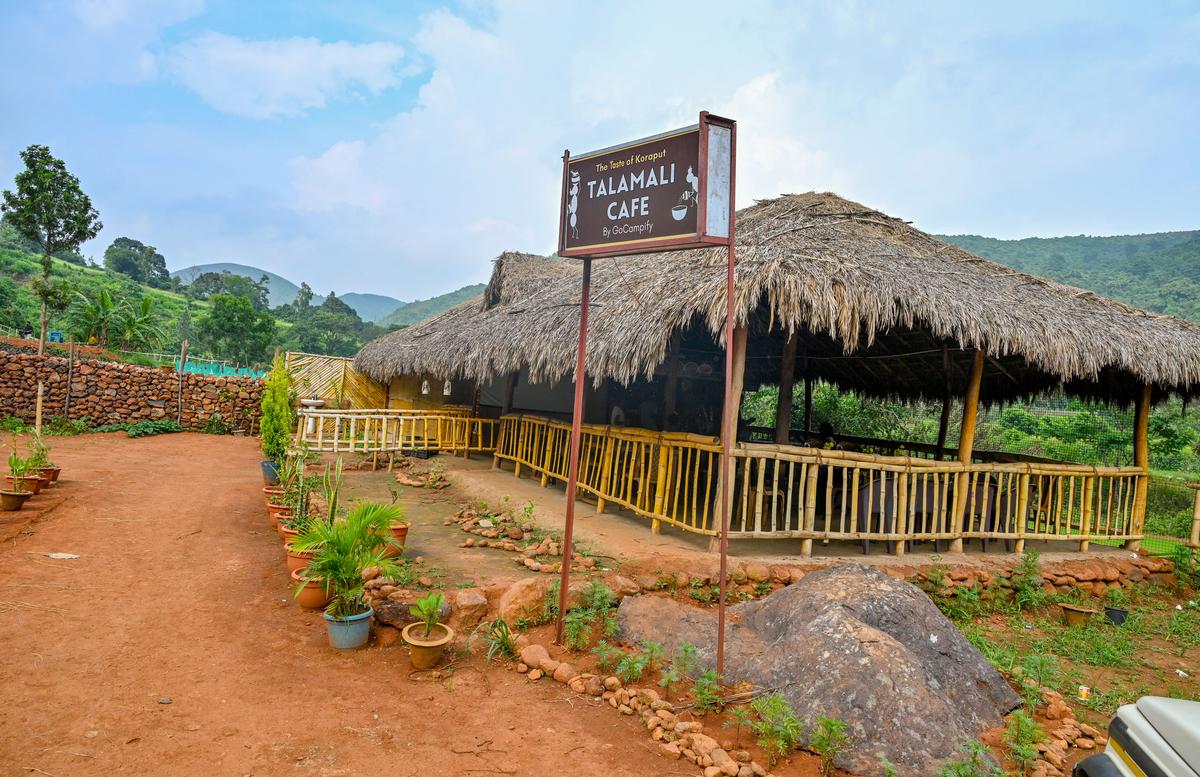A traditional thali at Talamali Cafe, nestled in Koraput’s hills, which offers local flavors of food.
| Photo Credit: KR Deepak
At the base of Talamali, once the descent ends and tree cover gives way to farmland, a low wooden board announces the presence of Talamali Cafe. There are no banners, no roadside flags, just the board nailed to a post beside a bend in the trail. The cafe itself sits a few metres beyond, built with a thatched roof, local timber and mud-coated walls. It opens toward a slow-moving stream, with a modest seating area that looks out onto fields bordered by low hills.
Started in January in association with GoCampify, Talamali Cafe is the only place in the area that serves a Koraputia meal. It currently offers a thali that reflects local cooking practices without rearrangement for outside preferences.

Talamali Cafe, nestled in Koraput’s hills, which offers local flavors of food.
| Photo Credit:
KR Deepak
When I arrived here in an afternoon, the kitchen had just begun lunch service. I was served a non-vegetarian thali that was straightforward in presentation but carefully prepared. It included a bowl of tur dal, rice from a native upland variety, crisp, fried bitter gourd, brahmi saag (a locally grown green leafy vegetable) lightly cooked with mustard, and the house speciality, ragi chicken – a dish not commonly found outside tribal households. The chicken is simmered with garlic, green chilli, and ragi flour, forming a dark, thick sauce that settles into the grain. The plate was rounded off with a sweet porridge made from little millets, unadorned and not overly sweet.
Breakfast runs from 8am to 10am, and the offerings are built entirely around ragi, the district’s staple grain. Ragi idli, ragi dosa, ragi puri, and ragi upma form the morning menu. Everything is made without pre-mix or factory flour. What is cooked depends on the day’s availability and preparation by the kitchen’s two main cooks, local women who have worked in the area long before the cafe existed.
“We are on three acres here,” says Chandan Choudhury, the cafe’s founder. “The stream marks one boundary, and on the other side, we are cultivating vegetables now.” Chandan explains that they intentionally kept the seating sparse. Some chairs and tables are under the thatch and a few more tables placed alongside the river for those who prefer to eat in open air.
In addition to food, the cafe has begun offering traditional tribal attire for rent. A highlight of the collection is a Kerang, a two-piece textile in off-white and orange, woven decades ago. “This is about fifty years old,” Choudhury said, lifting the fabric carefully. “Very few wear it now.”
Construction has begun on three tribal-themed cottages and two container rooms, expected to open by the end of the year. For now, the cafe runs with a staff of eight, all locals, with no ambition to expand beyond what the space can hold.
Published – June 27, 2025 10:54 am IST

